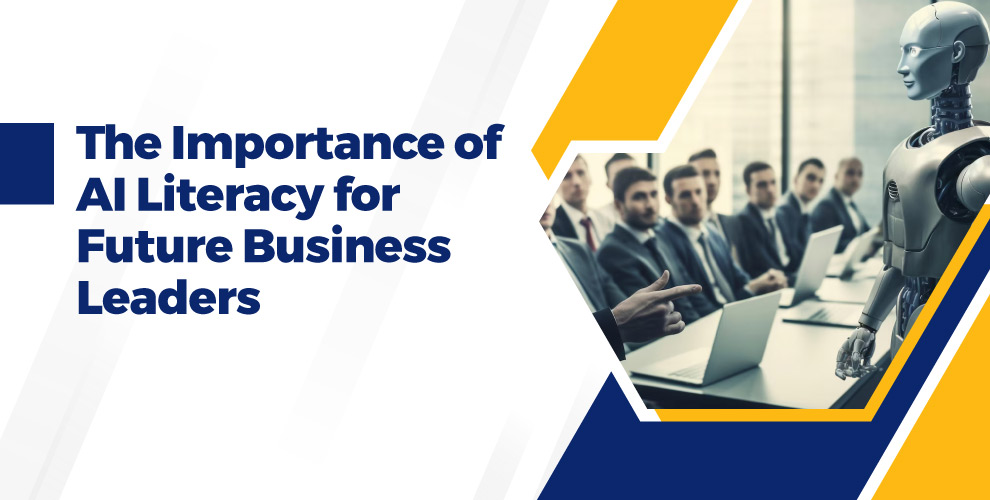Introduction
Artificial intelligence (AI) is transforming the business landscape, driving innovation, efficiency, and competitive advantage. As AI continues to evolve, the importance of AI literacy for future business leaders cannot be overstated. Understanding AI and its applications is crucial for making informed decisions and leading organizations effectively in the digital age.
Understanding AI Literacy
Definition of AI Literacy
AI literacy encompasses the knowledge, skills, and attitudes necessary to understand and engage with AI technologies. It involves a foundational understanding of how AI works, its potential applications, and the ethical considerations surrounding its use.
Core Components of AI Literacy
- Knowledge: Understanding the basics of AI, including machine learning, natural language processing, and data analytics.
- Skills: Developing the ability to apply AI tools and techniques to solve business problems.
- Attitudes: Cultivating a mindset that embraces technological change and continuous learning.
Benefits of AI Literacy for Business Leaders
Enhanced Decision-Making
AI literacy equips business leaders with the ability to leverage data-driven insights for better decision-making. By understanding AI, leaders can interpret complex data, predict trends, and make strategic choices that enhance business performance.
Improved Operational Efficiency
AI technologies can automate routine tasks, optimize processes, and improve efficiency. Leaders who are literate in AI can identify opportunities for automation and implement AI solutions to streamline operations, reduce costs, and increase productivity.
Innovation and Competitive Advantage
AI literacy fosters innovation by enabling leaders to explore new business models and revenue streams. Companies that adopt AI technologies can gain a competitive edge, offering unique products and services that differentiate them from competitors.
Ethical Considerations and Responsible AI Use
Understanding AI’s ethical implications is crucial for responsible leadership. AI-literate leaders can ensure that AI applications align with ethical standards, promoting transparency, fairness, and accountability in AI deployment.
Developing AI Literacy
Educational Pathways: B Tech in Data Science and Artificial Intelligence
Pursuing a B Tech in Data Science and Artificial Intelligence is a robust pathway to developing AI literacy. These programs provide comprehensive education in AI technologies, data analytics, and machine learning, equipping students with the skills needed to excel in the AI-driven business world.
The Importance of Formal Education
Formal education in AI and data science offers structured learning and access to expert knowledge. Enrolling in reputable programs ensures that future business leaders receive high-quality education and hands-on experience with cutting-edge AI tools.
Highlighting the Best Artificial Intelligence and Data Science Colleges in Coimbatore
Coimbatore is home to some of the best artificial intelligence and data science colleges. These institutions offer top-notch programs designed to prepare students for leadership roles in the AI-driven business environment. Notable colleges include [XYZ College] and [ABC Institute], renowned for their advanced curriculum and industry collaborations.
Real-World Applications of AI in Business
Case Studies of AI Implementation
Examining real-world examples of AI implementation helps illustrate its impact on business. For instance, AI in finance enables predictive analytics for risk management, while in healthcare, AI-powered diagnostic tools improve patient outcomes. Retailers use AI for personalized marketing, and manufacturers leverage AI for predictive maintenance.
Key Industries Leveraging AI
- Finance: AI-driven analytics for fraud detection and customer insights.
- Healthcare: AI-assisted diagnostics and treatment planning.
- Retail: Personalized shopping experiences and inventory management.
- Manufacturing: Process automation and predictive maintenance.
Strategies for Business Leaders to Stay Updated
Continuous Learning and Professional Development
Business leaders must commit to continuous learning to keep pace with AI advancements. Online courses, workshops, and certification programs offer opportunities to deepen AI knowledge and skills.
Networking and Collaboration with AI Experts
Engaging with AI professionals and joining industry networks fosters knowledge exchange and collaboration. Leaders can learn from AI experts and stay informed about the latest trends and innovations.
Attending Conferences and Industry Events
Participating in AI conferences and industry events provides insights into emerging technologies and best practices. These events offer platforms for networking, learning, and staying updated on AI developments.
Conclusion
AI literacy is essential for future business leaders aiming to navigate the complexities of the digital age. By understanding AI, leaders can make informed decisions, drive innovation, and maintain a competitive edge. Embracing AI literacy through education, continuous learning, and collaboration will prepare business leaders to lead effectively in an AI-driven world.


